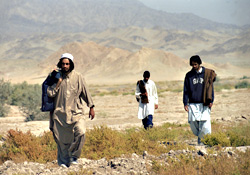Torture is legal; the president monitors it almost daily, as we learn in Ron Suskind’s new book, The One Percent Doctrine. Prisoners are committing suicide in protest, believing in the greater mercy of the beyond. And the Supreme Court last week declared that the trials being conducted at Gitmo are illegal, putting itself surprisingly in line with media and opinion in the rest of the civilized world. Welcome to Guantánamo Bay, our shining symbol of democracy, just another valuable tool for the Bush-Cheney administration to turn the entire Arab-Muslim world against us. (That is, if the Iraq war and Abu Ghraib haven’t already done the job.)
One of the two important new films to deal with Gitmo at SIFF this spring, Michael Winterbottom’s calmly horrifying docudrama relates the story of the Tipton Three, a trio of young Englishmen captured in Afghanistan during the U.S. invasion of that lawless country, where terrorists including bin Laden were definitely at work. So did that make Ruhel Ahmed, Asif Iqbal, and Shafiq Rasul terrorists? Or were they, as they’ve always maintained, merely curious members of a wedding party who strayed over the border from Pakistan—where Asif was to be married—simply to see beautiful, war-torn Kabul, explore scenic mine fields, and have photos taken with those jolly fellows in the Taliban?
Even if the truth lies somewhere between, it’s hard to argue—unless your name is Clarence Thomas or Alberto Gonzales—that the Tipton Three deserved such harsh treatment during their two years at Gitmo. Shaved bald, stripped naked, chained to the floor in a forced squat, deafened with death metal, watching their copies of the Koran kicked into the dirt, held in isolation for months: This is what Rummy, in a news clip, calls “consistent with the Geneva Convention—for the most part.” At SIFF, the line drew a sardonic laugh, as did a numbskull American interrogator’s demand, “I wanna know where bin Laden is!”
Clearly the Three have no idea. Winterbottom alternates between their subsequent interview accounts (from co-director Mat Whitecross) and re-enactments of their ordeal—shot on DV, vérité-style like his immigrant saga, In This World. Both films deal with the West’s incomprehension—if not outright hostility—toward the darker-skinned Islamic world. One of the ironies at work here, as revealed in flashbacks to the Three’s carefree life before Camp X-Ray, is how these fairly secular lads emerged more religious after all their suffering. In addition to reading Harry Potter and composing rap songs between interrogation sessions, they study the Koran. Says Asif of their abuse, “It either destroys you or makes you stronger.” Nietzsche meets Allah—there’s a bridging of two cultures you wouldn’t have thought possible.
Winterbottom doesn’t make a great effort to individualize the Three; there are a few explanatory titles and dates, plus some TV news footage that helps us place them in the post-9/11 timeline. Though a wrenching personal experience, their story is a general one, and a warning to both sides of the cultural schism: Gitmo is but a symptom of a world in danger of dividing itself into only torturers and terrorists.








